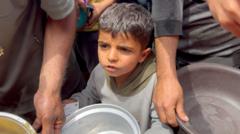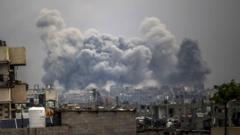Following significant pressure from U.S. allies, Israeli Prime Minister Benjamin Netanyahu has agreed to allow a minimal amount of food supplies into Gaza, which has been under blockade for over 10 weeks. The decision comes amid intensified military operations and reports of humanitarian crises in the region.
Israel Eases Gaza Food Blockade Amid Political Pressure and Ongoing Military Offensive

Israel Eases Gaza Food Blockade Amid Political Pressure and Ongoing Military Offensive
In response to international pressure, Israel's Prime Minister announces a limited allowance of food aid into Gaza, while intensifying military actions against Hamas.
Israel's Prime Minister Benjamin Netanyahu has announced that a "minimal" amount of food supplies will be allowed into Gaza after 11 weeks of blockade, a decision he attributes to increased pressure from allies in the U.S. Senate. Netanyahu emphasized in a video statement that it is crucial to avoid famine, both from practical and diplomatic angles.
Beginning Monday, aid lorries began to arrive at the Kerem Shalom crossing, facilitating distribution of basic food supplies, though this will only last until Israeli military and American companies implement a long-term aid distribution plan, which the UN has rejected. Concurrently, reports indicate that Israeli air strikes have resulted in the deaths of at least 20 people in Gaza as part of an ongoing military offensive against Hamas, which commenced on October 7 in response to a cross-border attack.
The humanitarian situation in Gaza remains dire, with more than 3,000 fatalities and widespread displacement reported as the Israeli military continues its operations. The UN reports that severe shortages of food, medicine, and fuel are affecting half a million people in Gaza, leading to dire health outcomes, including malnutrition-related deaths.
While Netanyahu's government has faced backlash for this concession—particularly from far-right officials who deem it a mistake that could embolden Hamas—the prime minister insists that allowing humanitarian aid is necessary to prevent starvation. Israeli officials contend that allegations of aid shortages have been exaggerated and accuse Hamas of misappropriating resources.
Despite the approved aid, the Israeli government has dismissed the prospect of collaborating with UN agencies, who refuse to work under the new Israeli-U.S. distribution plan, citing violations of humanitarian principles. As military actions intensify, with significant ground operations reported, the Israeli government remains focused on defeating Hamas and aims to secure the release of hostages still held in the territory. Both sides remain in indirect negotiations, but tangible progress appears stalled.





















